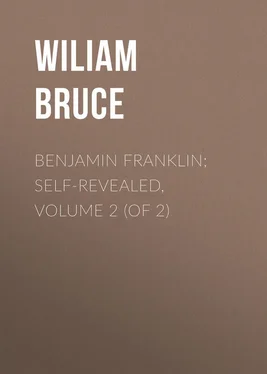Wiliam Bruce - Benjamin Franklin; Self-Revealed, Volume 2 (of 2)
Здесь есть возможность читать онлайн «Wiliam Bruce - Benjamin Franklin; Self-Revealed, Volume 2 (of 2)» — ознакомительный отрывок электронной книги совершенно бесплатно, а после прочтения отрывка купить полную версию. В некоторых случаях можно слушать аудио, скачать через торрент в формате fb2 и присутствует краткое содержание. Жанр: foreign_antique, foreign_prose, на английском языке. Описание произведения, (предисловие) а так же отзывы посетителей доступны на портале библиотеки ЛибКат.
- Название:Benjamin Franklin; Self-Revealed, Volume 2 (of 2)
- Автор:
- Жанр:
- Год:неизвестен
- ISBN:нет данных
- Рейтинг книги:4 / 5. Голосов: 1
-
Избранное:Добавить в избранное
- Отзывы:
-
Ваша оценка:
- 80
- 1
- 2
- 3
- 4
- 5
Benjamin Franklin; Self-Revealed, Volume 2 (of 2): краткое содержание, описание и аннотация
Предлагаем к чтению аннотацию, описание, краткое содержание или предисловие (зависит от того, что написал сам автор книги «Benjamin Franklin; Self-Revealed, Volume 2 (of 2)»). Если вы не нашли необходимую информацию о книге — напишите в комментариях, мы постараемся отыскать её.
Benjamin Franklin; Self-Revealed, Volume 2 (of 2) — читать онлайн ознакомительный отрывок
Ниже представлен текст книги, разбитый по страницам. Система сохранения места последней прочитанной страницы, позволяет с удобством читать онлайн бесплатно книгу «Benjamin Franklin; Self-Revealed, Volume 2 (of 2)», без необходимости каждый раз заново искать на чём Вы остановились. Поставьте закладку, и сможете в любой момент перейти на страницу, на которой закончили чтение.
Интервал:
Закладка:
"Like a Newton sublimely he soared
To a summit before unattained,
New regions of science explored
And the palm of philosophy gained.
"With a spark which he caught from the skies
He displayed an unparalleled wonder,
And we saw with delight and surprise
That his rod could secure us from thunder.
"Oh! had he been wise to pursue
The track for his talents designed,
What a tribute of praise had been due
To the teacher and friend of mankind.
"But to covet political fame
Was in him a degrading ambition,
The spark that from Lucifer came
And kindled the blaze of sedition.
"Let candor then write on his urn,
Here lies the renowned inventor
Whose fame to the skies ought to burn
But inverted descends to the centre."
The election began at nine o'clock in the morning on October 1, 1764. Franklin and Galloway headed the "Old Ticket," and Willing and Bryan the "New." The latter ticket was supported by the Dutch Calvinists, the Presbyterians and many of the Dutch Lutherans and Episcopalians; the former by the Quakers and Moravians and some of the McClenaghanites. So great was the concourse of voters that, until midnight, it took fifteen minutes for one of them to work his way from the end of the line of eager electors to the polling place. Excitement was at white heat, and, while the election was pending, hands were busy scattering squibs and campaign appeals in English and German among the crowd. Towards three the next morning, the new-ticket partisans moved that the polls be closed, but the motion was opposed by their old-ticket foes, because they wished to bring out a reserve of aged or lame retainers who could not stand long upon their feet. These messengers were dispatched to bring in such retainers from their homes in chairs and litters, and, when the new-ticket men saw the success, with which the old-ticket men were marshalling their recruits, they, too, began to scour the vicinage for votes, and so successful were the two parties in mobilizing their reserves that the polls did not close until three o'clock in the afternoon of the second day. Not until the third day were the some 3900 real and fraudulent votes cast counted; and, when the count was over, it was found that Franklin and Galloway had been defeated. "Franklin," said an eye-witness of the election, "died like a philosopher. But Mr. Galloway agonized in death like a mortal deist, who has no hopes of a future life."
As for Franklin, his enemies had simply kicked him upstairs. A majority of the persons returned as elected belonged to his faction, and, despite the indignant eloquence of Dickinson, who declared him to be the most bitterly disliked man in Pennsylvania, the Assembly, by a vote of nineteen to eleven, selected him as the agent of the Province to go over to England, and assist Richard Jackson, its standing agent, in "representing, soliciting and transacting the affairs" of the Province for the ensuing year.
The minority protested; and moved that its protest be spread upon the minutes, and, when this motion was denied, it published its remonstrance in the newspapers. This act provoked a pamphlet in reply from Franklin entitled Remarks on a Late Protest
Конец ознакомительного фрагмента.
Текст предоставлен ООО «ЛитРес».
Прочитайте эту книгу целиком, купив полную легальную версию на ЛитРес.
Безопасно оплатить книгу можно банковской картой Visa, MasterCard, Maestro, со счета мобильного телефона, с платежного терминала, в салоне МТС или Связной, через PayPal, WebMoney, Яндекс.Деньги, QIWI Кошелек, бонусными картами или другим удобным Вам способом.
1
In his True Benjamin Franklin , p. 163, Sydney George Fisher makes these statements: "In a letter written to Mrs. Stevenson in London, while he (Franklin) was envoy to France, he expresses surprise that some of the London tradespeople still considered him their debtor for things obtained from them during his residence there some years before, and he asks Mrs. Stevenson, with whom he had lodged, how his account stands with her… He appears to have overdrawn his account with Hall, for there is a manuscript letter in the possession of Mr. Howard Edwards, of Philadelphia, written by Hall, March 1, 1770, urging Franklin to pay nine hundred and ninety-three pounds which had been due for three years." What Franklin's letter to Mrs. Stevenson, which is dated Jan. 25, 1779, states is that he had been told after reaching France that Mr. Henley, the linen-draper, had said that, when the former left England for America, he had gone away in his debt. The letter questions whether Henley ever made such a statement, asks Mrs. Stevenson to let the writer know the meaning of it all, and adds: "I thought he had been fully paid, and still think so, and shall, till I am assur'd of the contrary." The account that the letter asks of Mrs. Stevenson was probably for the shipping charges on the white cloth suit, sword and saddle, which had been forwarded, as the letter shows, to Franklin at Passy by Mrs. Stevenson. Or it may have well been for expense incurred by Mrs. Stevenson in performing some similar office for him. For instance, when he was on the point of leaving England in 1775, he wrote to a friend on the continent that, if he had purchased a certain book for the writer, Mrs. Stevenson, in whose hands he left his little affairs till his return, which he proposed, God willing, in October, would pay the draft for it.
A letter from Franklin to Mrs. Stevenson, dated July 17, 1775, shows that there had been mutual accounts between them during his long and familiar intercourse with her under the Craven Street roof. With this letter, he incloses an order for a sum of money that she had intrusted to him for investment, and also an order for £260 more, "supposing," he says, "by the Sketch Mr. Williams made of our Accts. that I may owe you about that Sum." "When they are finally settled," he further says, "we shall see where the Ballance lies, and easily rectify it." If the account in question had any connection with these accounts the unliquidated nature of the latter, the abruptness with which Franklin was compelled to leave England in 1775, coupled with his expectation of returning, the troubled years which followed and the difficulty of finally settling detailed accounts, when the parties to them are widely separated, furnish a satisfactory explanation of the delay in settlement. If Franklin did not pay a balance claimed from him by Hall on the settlement of their partnership accounts, after the expiration of the partnership in 1766, it was doubtless because of his own copyright counter-claim to which we have already referred in our text.
2
In recent years there has been a tendency to disparage the merits of Henry Laurens. The Hales in their Franklin in France speak of him "as a very worthy, but apparently very inefficient, member of the Commission." In his admirable prolegomena to the Diplomatic Correspondence of the American Revolution , which is well calculated to excite the regret that lawyers do not oftener bring the professional habit of weighing evidence to bear upon historical topics, Dr. Francis Wharton says: "The influence he exerted in the formation of the treaty was but slight, and his attitude as to the mode of its negotiation and as to its leading provisions so uncertain as to deprive his course in respect to it of political weight." Dr. Wharton also reaches the conclusion that Henry Laurens was deficient, in critical moments, both in sagacity and resolution. On the other hand Moses Coit Tyler in his Literary History of the American Revolution declares that, coming at last upon the arena of national politics, Laurens was soon recognized for what he was, "a trusty, sagacious, lofty, imperturbable character." In another place in the same work, Tyler speaks of the "splendid sincerity, virility, wholesomeness and competence of this man – himself the noblest Roman of them all – the unsurpassed embodiment of the proudest, finest, wittiest, most efficient, and most chivalrous Americanism of his time." And in still another place in the same work the Narrative of the Capture of Henry Laurens is described "as a modest and fascinating story of an heroic episode in the history of the Revolution, a fragment of autobiography fit to become a classic in the literature of a people ready to pay homage to whatever is magnanimous, exquisite and indomitable in the manly character." To anyone familiar with the whole conduct of Laurens in the Tower and the other facts upon which Dr. Wharton based his judgment as to his sagacity and firmness at trying conjunctures, these statements of Tyler are to a certain extent mere academic puffery. We see no reason, however, to shade the character that we have ascribed to Laurens in the text. Writing to Franklin about him after his release from the Tower, John Adams said: "I had vast pleasure in his conversation; for I found him possessed of the most exact judgment concerning our enemies, and of the same noble sentiments in all things which I saw in him in Congress." And some eighteen months later Franklin wrote to Laurens himself in terms as strong as that he should ever look on his friendship as an honor to him.
Читать дальшеИнтервал:
Закладка:
Похожие книги на «Benjamin Franklin; Self-Revealed, Volume 2 (of 2)»
Представляем Вашему вниманию похожие книги на «Benjamin Franklin; Self-Revealed, Volume 2 (of 2)» списком для выбора. Мы отобрали схожую по названию и смыслу литературу в надежде предоставить читателям больше вариантов отыскать новые, интересные, ещё непрочитанные произведения.
Обсуждение, отзывы о книге «Benjamin Franklin; Self-Revealed, Volume 2 (of 2)» и просто собственные мнения читателей. Оставьте ваши комментарии, напишите, что Вы думаете о произведении, его смысле или главных героях. Укажите что конкретно понравилось, а что нет, и почему Вы так считаете.










![Benjamin Franklin - Memoirs of Benjamin Franklin; Written by Himself. [Vol. 2 of 2]](/books/747975/benjamin-franklin-memoirs-of-benjamin-franklin-wr-thumb.webp)
![Benjamin Franklin - Memoirs of Benjamin Franklin; Written by Himself. [Vol. 1 of 2]](/books/748053/benjamin-franklin-memoirs-of-benjamin-franklin-wr-thumb.webp)
